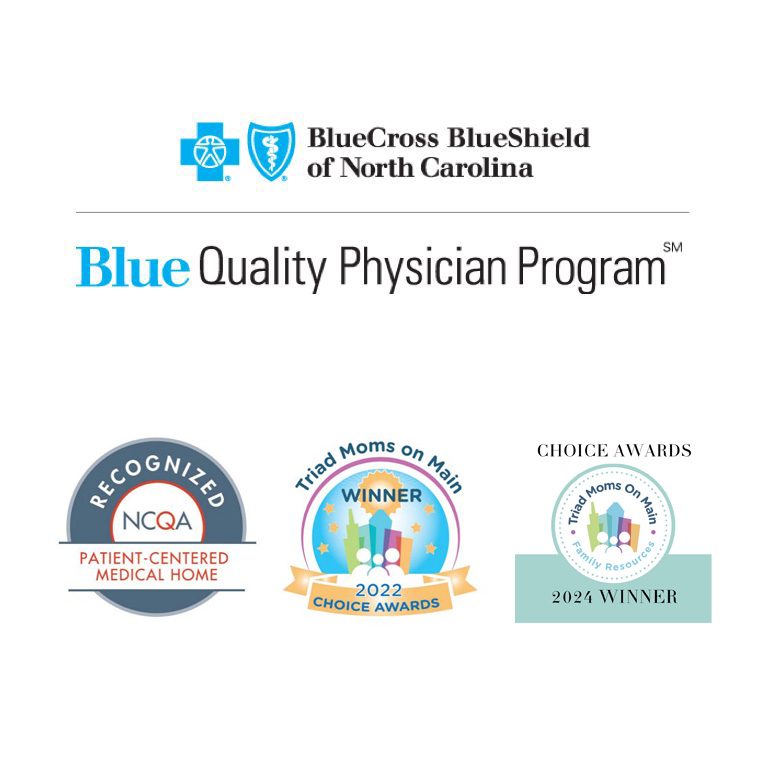We offer complete care from the first pregnancy symptom to birth:
- Comprehensive prenatal care
- Schedule for prenatal care
- Genetic screening
- High risk pregnancy care
- Diabetes
- High blood pressure
- History of preterm delivery
- Twin gestation
- 2D/3D/4D ultrasound
- Trial of labor after cesarean (TOLAC)/ Vaginal birth after cesarean (VBAC)
- Providing delivery care at both Novant Health Forsyth Medical Center and Wake Forest Baptist Medical Center
Medications in pregnancy:
If you are taking any medications or have a medical condition, please make an appointment as soon as you know you are pregnant. Let us know about any prescription medication, over-the-counter medication, herbal products or supplements you are using.
Please talk with us before you use any medication during pregnancy or during breast feeding. Use the list below to research the best medicine to take for your symptoms.
Over-the-counter Medications Considered Safe During Pregnancy:
Pain / Headaches
Tylenol (acetaminophen) is safe at any time in pregnancy especially when used as one time treatment. Treating fever with Tylenol may actually protect your baby from the harmful effects of fever. If you feel you need to use Tylenol repeatedly for more than a few days, talk to us. Low-dose aspirin may be prescribed by your doctor for certain medical problems, but otherwise do not use aspirin, Motrin (ibuprofen), Aleve (naproxen).
Morning Sickness
If you experience morning sickness, there are several things you can do that might help you feel better:
- Get plenty of rest.
- Avoid smells that bother you.
- Eat five or six small meals each day instead of three large meals.
- Eat a few crackers before you get out of bed in the morning to help settle your stomach.
- Eat small snacks high in protein (such as a glass of milk or a cup of yogurt) throughout the day.
- Avoid spicy foods and fatty foods. Avoid any foods you find unappealing.
- Take your prenatal vitamin at bedtime or with a snack.
Ginger may be helpful for some women. Taking three 250-milligram capsules of ginger a day plus another capsule right before bed may help relieve nausea. Ginger ale, tea or candies may help. Vitamin B6 (pyridoxine) may be tried. Start with 25mg three times a day. Don’t take more than 200mg in one day. Doxylamine (Unisom) can be added at night. Diclegis is a prescription medication which has B6 and doxylamine combined.
*Call us for persistent vomiting or if you are unable to keep down fluids.
Cough and Cold
If you think you have the flu or are exposed to the flu, call us immediately. A flu shot is the best defense. Lozenges (Chloraseptic, Cepacol, Cepastat, Cold-eeze, Sucrets, Ricola, Vicks) are safe to use for a sore throat. If you need a cough suppressant, dextromethorphan can be used (DayQuil Cough, Delsym, Delsym 12 Hour Cough Relief, Robitussin CoughGels, Sucrets DM Cough, Theraflu Thin Strips Cough, Triaminic Long Acting Cough).
If you need an expectorant, guaifenesin may be used, but should be avoided in the first trimester (Mucinex, Duratuss G, Robitussin, Scot-Tussin). Avoid prolonged use and combination products with ingredients you don’t need. For example a dry cough would require only dextromethorphan, but a productive cough may require both dextromethorphan and guaifenesin (DayQuil Mucus Control DM, Delsym Cough Plus Chest Congestion DM, Mucinex DM, Robitussin Cough + Chest Congestion DM)
Congestion
Congestion (stuffy nose) is very common and troublesome in pregnancy. It can be due to infections or allergies. First try saline nasal spray, a Neti pot, humidifier or Breath Right strips. Drink plenty of fluids and rest. If these measures don’t work decongestants are next option. Use caution with the use of decongestants and avoid them in the first trimester as there is some information showing a slight increase in the risk of birth defects.
Oxymetazoline Nasal Sprays (Afrin, Dristan 12 Hour, Neo-Synephrine 12 Hour Severe Sinus Congestion, Vicks Sinex 12 Hour Nasal Decongestant, Zicam Extreme Congestion Relief) should be avoided in the first trimester and only used for a limited time.
Pseudoephedrine (Sudafed, Drixoral Nasal Decongestant, Entex) can be used if needed but avoid it in the first trimester. Pseudoephedrine can also be found in many combination products.
Phenylephrine (Dimetapp Cold Drops, Sudafed PE) can be used if needed, but avoid it in the first trimester and can also be found in many combination products.
Allergy
Antihistamines are considered safe for pregnancy. These are also found in many combination products. Diphenhydramine (Benadryl) is the most commonly used. Brompheniramine and chlorpheniramine are similar. Newer anti-histamines are cetirizine (Zyrtec), loratadine (Claritin) and fexofenadine (Allegra).
Heartburn/Indigestion
First try smaller, more frequent meals, avoid spicy foods, don’t eat the last 4 hours before bedtime and elevate your head while lying down.
The first line of medication are calcium carbonate antacids (Tums, Rolaids Soft Chews) as you need the calcium anyway. Don’t use more than 1500 mg daily. Calcium containing antacids are preferred over aluminum antacids like Maalox. If antacids aren’t enough you can add another medication. The next step would be ranitidine (Zantac) or famotidine (Pepcid) which are safe to use. If they don’t work, omeprazole (Prilosec) or pantoprazole (Protonix) can be used.
Constipation
Prevention is best. First drink plenty of water, eat high fiber foods such as whole wheat, bran, split peas, lentils, black beans, lima beans, baked beans, artichokes, prunes and raspberries. Exercise every day.
Dietary fiber is ideal but there are fiber supplements as an option: Metamucil, Benefiber, Citrucel and Fibercon are examples.
For hard stools, stool softeners that contain docusate are safe (Colace, Surfak)
For immediate relief of constipation you can use the following which are listed starting with mild to more effective: glycerin suppository, Milk of Magnesia, Dulcolax.
For repeated problems with constipation consider Miralax.
Do not use mineral oil or castor oil.
Diarrhea
Kaopectate is safe to use. Imodium is safe after the first trimester. Avoid Pepto-Bismol.
Hemorrhoids
Anusol HC and Tucks pads are safe. Avoid hard stools.
Vaginal Yeast Infection
If you are confident you have a yeast infection (thick discharge with itching, no foul odor, no bleeding), you may use clotrimazole (Gyne-lotrimin) or miconazole (Monistat). Insert the applicator only 1 inch into the vagina and inject the cream slowly. The “yeast pill,” Diflucan, is not used in pregnancy.
Rash
If you are itching all over but have no rash, call us promptly. If you have a new rash, call too. Oatmeal baths or Calamine lotion are safe to use. Benadryl by mouth can be used but it will caused drowsiness which may be a benefit at bedtime. Alternatively, Zyrtec may be used and won’t make you drowsy. Benadryl cream is safe but may not be helpful. Hydrocortisone cream (Cortaid, Cortisone) may be used sparingly.
Insomnia
Insomnia is common and often difficult to treat in pregnancy. Don’t eat or drink 4 hours prior to bedtime. Turn the lights down 30 minutes before retiring. Don’t read, watch TV or use your computer in bed. Benadryl or Unisom are safe. They may not work as well if used repeatedly. Tylenol PM is safe but unless you need the Tylenol for pain, use Benadryl instead.
Leg Cramps
Although there is no proof that calcium or potassium definitely help leg cramps, both calcium and potassium are important for you and your baby. Make sure to get 1200mg of calcium daily. Get plenty of potassium. Good sources of potassium include winter squash, bananas, peaches, potatoes with the skin, white beans, yogurt, orange juice, lentils and pistachios.When you get a cramp in your calf, straighten your legs, bend the foot and toes up, get up and walk or massage the calf. A leg cramp will go away after few minutes. Pain that doesn’t go away along with swelling or a blue or pale leg may be a blood clot and requires an immediate phone call.
Digestive
Probiotics are safe to take with pregnancy.


